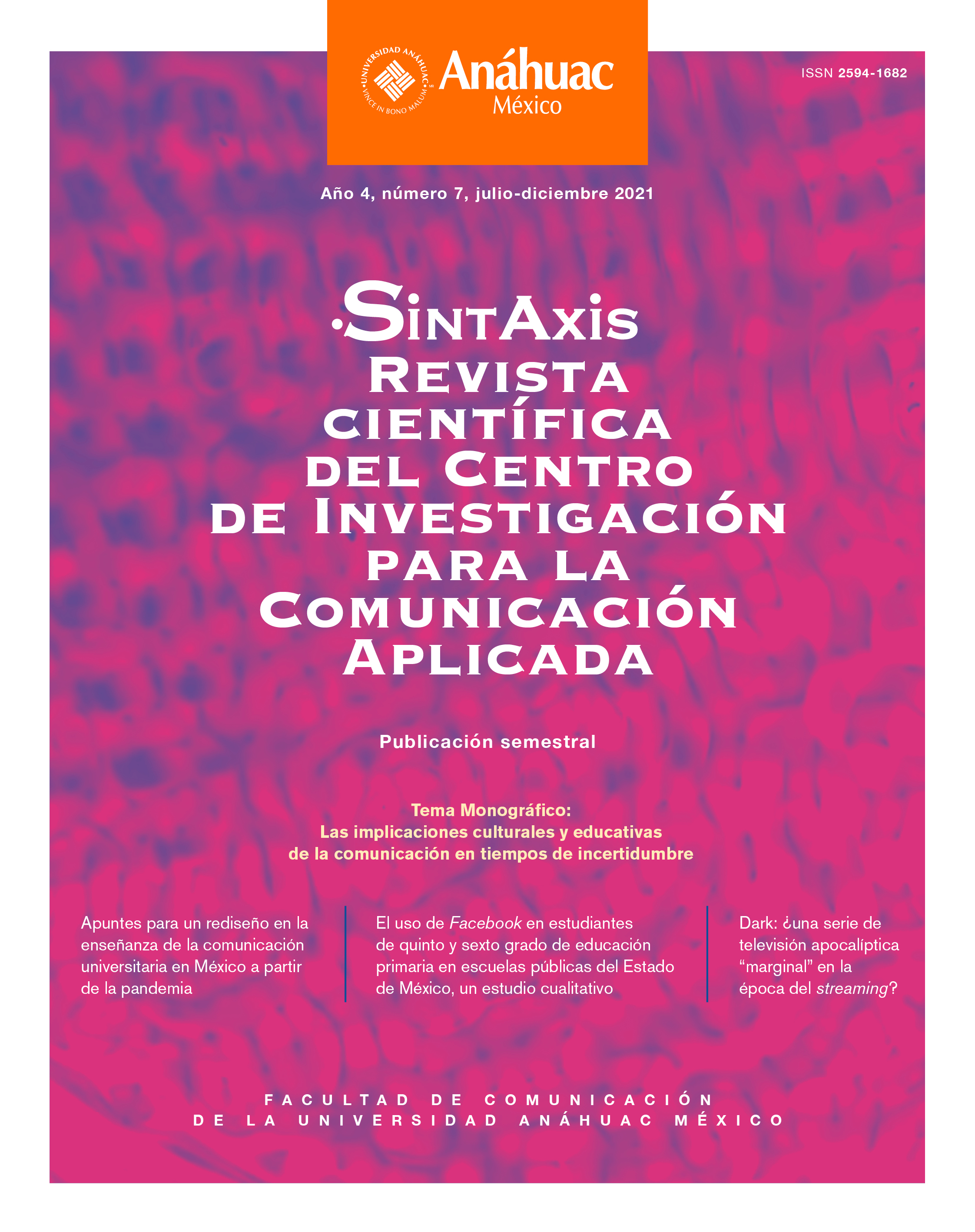Polarization in contemporary democracies. Outline of an analytical model of populist political communication
Main Article Content
Abstract
The aim of this paper is to outline a model of analysis of populist political communication based on the elements of a mixed process of political polarization. To develop it, first we define what we mean by political polarization, then its relationship with the digital media is described and finally the populist political communication style is exposed as a factor that completes this mixed process of polarization; this will lead to the conclusion that polarization is inversely proportional to democratic stability and that the analysis model would allow us to identify its potential risks.
Downloads
PLUMX Metrics
Article Details
The author keeps the property rights with no restriction whatsoever and guarantees the magazine the right to be the first publication of the work. The author is free to deposit the published version in any other medium, such as an institutional archive or on his own website.
References
Arditi, B. (2017). La política en los bordes del liberalismo. Diferencia, populismo, revolución, emancipación Barcelona: Gedisa.
Aristóteles (2011). Política. México: UNAM.
Arroyo Kalis, J. A. (2018). El derecho de réplica: una aproximación teórica. En J. A. Magaña de la Mora, E. Roa Ortíz, & E. Ferrer Mac-Gregor (Eds.), Derecho procesal constitucional en perspectiva histórica (pp. 17-34). México: IIJ-UNAM.
Artículo 19. (2021). Distorsión. El discurso contra la realidad. Recuperado de: https://articulo19.org/distorsion/ Consultado el 29 de marzo de 2021.
Bail, C. A., Argyle, L. P., Brown, T. W., Bumpus, J. P., Chen, H., Hunzaker, M. F. … Volfovsky, A. (2018). Exposure to opposing views on social media can increase political polarization. Proceedings of the National Academy of Sciences, 115 (37), 9216-9221. https://doi.org/10.1073/pnas.1804840115
Barnidge, M., Huber, B., Gil de Zúñiga, H., & Liu, J. H. (2018). Social media as a sphere for ‘risky’ political expression: A twenty-country multilevel comparative analysis. The International Journal of Press/Politics, 23(2), 161–182. https://doi.org/10.1177/1940161218773838
Bobbio, N. (1986). El futuro de la democracia. México: Fondo de Cultura Económica.
Bovero, M. (2002). Una gramática de la democracia. Madrid: Trotta.
Bruns, A. (2019). Are Filter Bubbles Real? Cambridge, Reino Unido: Polity Press.
Buendía y Márquez (2021). Encuesta de Aprobación Presidencial. Recuperado de: http://buendiaymarquez.org/aprobacion-2021-01/ Consultada el 28 de marzo de 2021.
Campbell, J. E. (2016). Polarized: Making sense of a divided America. Princeton: Princeton
University Press.
Elizondo Mayer-Serra, C. (2021). Y mi palabra es la ley. México: Debate.
Estrada, L. Conferencias matutinas de AMLO, SPIN-Taller de Comunicación Política. Recuperado de: http://bit.ly/3hsg3mb
Filmus, Daniel. (2016), Una década de transformaciones en América Latina. En N. Trotta & P. Gentili (Comp.), América Latina: la democracia en la encrucijada (pp. 27-50). Buenos Aires: Editorial La Página.
Held, D. (2007). Modelos de democracia. Madrid: Alianza Editorial.
Laclau, Ernesto. (2006). La razón populista. México: Fondo de Cultura Económica.
Lee, J. K., Choi, J., Kim, C., & Kim, Y. (2014). Social media, network heterogeneity, and opinion polarization. Journal of Communication, 64(4), 702-722. https://doi.org/10.1111/jcom.12077
Londoño Pardo, O. I., Mora Morales, F. A., & Torres Malaver, C. I., (2020). El papel de la mediación comunicativa entre la polarización y la democracia en Colombia. Revista de Comunicación Política, 2, 11−28. https://doi.org/10.29105/rcp2-1
Lozada, M., (2014). Us or them? Social representations and imaginaries of the other in Venezuela. Papers on Social Representations, 23, 21.1–21.16. Recuperado de: http://saber.ucv.ve/handle/123456789/13623
Manfredi-Sánchez, J. L., Amado-Suárez, A., & Waisbord, S. (2021). Twitter presidencial ante la COVID-19: Entre el populismo y la política pop. Comunicar, 29(66), 79-90. https://doi.org/10.3916/C66-2021-07
McCoy, J., Rahman, T., & Murat, S. (2018) Polarization and the global crisis of democracy: Common patterns, dynamics, and pernicious consequences for democratic polities. American Behavioral Scientist, 62(1), 16–42.
https://doi.org/10.1177/0002764218759576
Morandé L., F. (2016). A casi tres décadas del Consenso de Washington. ¿Cuál es su legado en América Latina? Estudios Internacionales, 48(185), 31-58. https://doi.org/10.5354/0719-3769.2016.44553
Mouffe, C. (2018). Por un populismo de izquierda. Buenos Aires: Siglo XXI.
Offe, C. (2005). Las nuevas democracias: Transición política y renovación institucional en los países postcomunistas. Barcelona: Editorial Hacer.
O’Neil, S. K. (2016), Latin America’s populist hangover. What to do when the people’s party ends. Foreign Affairs, 95(6).
Pariser, E. (2011). The filter bubble: How the new personalized web is changing what we read
and how we think. Nueva York: Penguin.
Park, C. S. (2017). Unpacking the relationship between mobile phone usage patterns, network size, and civic engagement. Online Journal of Communication and Media Technologies, 7(2), 169–197. https://doi.org/10.29333/ojcmt/2596
Pía Lara, M. (2018), A conceptual analysis of the term ‘populism’. Thesis Eleven, 149(1), 31-47. https://doi.org/10.1177/0725513618815770
Prior, M. (2007). Post-broadcast democracy: How media choice increases inequality in political involvement and polarizes elections. Cambridge: Cambridge University Press.
Newman, N., Fletcher, R., Schulz, A., Andı, S., & Nielsen, R. K. (2020). Digital News Report 2020. Oxford University: Reuters Institute for the Study of Journalism. Recuperado de: https://reutersinstitute.politics.ox.ac.uk/sites/default/files/2020-06/DNR_2020_FINAL.pdf
Rojas, H. (2018). Tendencias y desafíos en comunicación política. (Artículo inédito). Universidad Externado de Colombia.
Rubio Núñez, R. (2018). Los efectos de la posverdad en la democracia. Revista de Derecho Político, 1(103), 191-228. https://doi.org/10.5944/rdp.103.2018.23201
Sartori, G. (1976). Parties and party systems: a framework for analysis. Cambridge: Cambridge University Press.
Schumpeter, J. (2016). Capitalismo, socialismo y democracia. Madrid: Página Indómita.
Slater, D. (2016). Polarization without poles: Oligarchy, populism, and democratic careening. Memo prepared for Polarized Politics Workshop, Georgia State University, Atlanta.
Sunstein, C. R. (2018). #Republic: Divided democracy in the age of social media. Princeton:
Princeton University Press.
Tocqueville, A. de (2020). La democracia en América. México: FCE.
Urman, A. (2019). Context matters: political polarization on Twitter from a comparative perspective. Media, Culture & Society, 42(6), 857-879 . https://doi.org/10.1177/0163443719876541
Valenzuela, S., & Rojas, H. (2019). Taming the digital information tide to promote equality. Nature Human Behaviour, 3, 1134–1136. https://doi.org/10.1038/s41562-019-0700-9
Waisbord, S. (2020). ¿Es válido atribuir la polarización política a la comunicación digital? Sobre burbujas, plataformas y polarización afectiva. Revista SAAP, 14(2), 249-279. https://doi.org/10.46468/rsaap.14.2.A1
Weber, M. (2014). Economía y sociedad. México: Fondo de Cultura Económica

